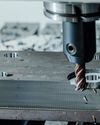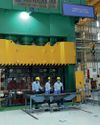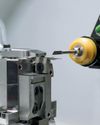
IN THIS NEW AGE, DATA GENERATED BY sensors and digital systems allow businesses to monitor processes taking place in the physical world, laying the foundation for more flexible modes of production-an approach increasingly required by changing consumer demands.
With economic, geopolitical, environmental, and population issues and crises rippling across the globe, industrial labour supply and supply chains are being impacted like never before. The COVID-19 pandemic, is shining a light on this need for advanced technology, real-time data, and flexible manufacturing and supply chains.
With increased automation and robots taking on repetitive, dangerous work, manufacturers can augment human labour and ensure the continuity of production. This frees up workers to leverage their cognitive brain power and enables re-shoring of previously offshored automated and repetitive work.
More localised supply chains can also add new flexibility to manufacturing, with the added benefit of reduced environmental impact from lower transportation complexity. Finally, with reliable and real-time data and easily reconfigurable systems, manufacturers can make decisions quickly such as scheduling maintenance, adjust a machine setting, or pivot from making shirts to face masks.
While some elements of the next industrial revolution remain aspirational - like fleets of autonomous robots cooperating on advanced tasks like construction, recovery and rescue, others are already being realized.
This story is from the November 2022 edition of Manufacturing Today.
Start your 7-day Magzter GOLD free trial to access thousands of curated premium stories, and 9,000+ magazines and newspapers.
Already a subscriber ? Sign In
This story is from the November 2022 edition of Manufacturing Today.
Start your 7-day Magzter GOLD free trial to access thousands of curated premium stories, and 9,000+ magazines and newspapers.
Already a subscriber? Sign In

Optimising milling operations
Exploring innovative strategies that are reshaping the milling landscape to meet the challenges of a competitive global market.

The path to excellence
Tata AutoComp’s Double Deming triumph is testament to quality and innovation

Boosting India's energy efficiency with advanced low voltage motors
Stefan Floeck, Division President of IEC Low Voltage Motors at ABB Motion, discusses the role of low voltage motors in India’s industrial future.

The Tech of E-commerce
Technology is revolutionising e-commerce by enhancing demand forecasting, inventory management, and customer experiences through AI, blockchain, IoT, and real-time data analytics.

Driving Sustainability and Innovation
A conversation with Rajendra B Chunodkar, President Manufacturing Operations, Lupin

The evolution of machining technologies
The evolution of machining technologies is reshaping the manufacturing landscape, offering unprecedented opportunities for efficiency, precision, and sustainability.

Transforming the future of manufacturing technology
A pre-event report on IMTEX 2025: The premier manufacturing and metal cutting technologies event for

THE MAKE IN INDIA JOURNEY
An analysis of the initiative's impact on the manufacturing sector.

Tata Motors Re.Wi.Re: Innovation meets responsibility
Tata Motors advances circular economy via Re.Wi.Re scrapping facility.
After Apple, Google Pixel set to be manufactured in India
Dixon Technologies' alliance with Compal Electronics is poised to further accelerate India's push to become a global hub for smartphone manufacturing.